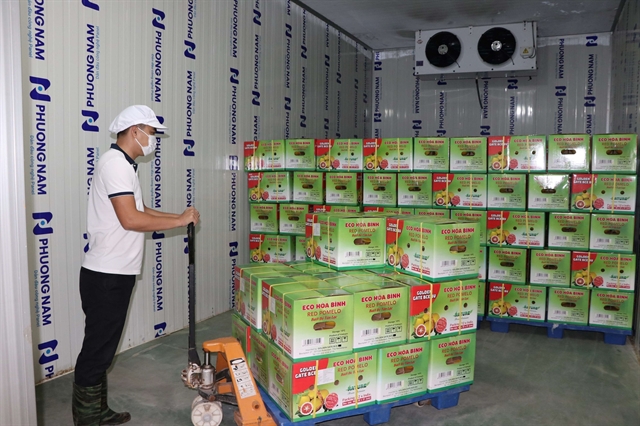Vietnam will ramp up efforts to meet the European Union’s (EU) stringent food safety regulations, ensuring that its agricultural products continue to thrive in one of global large markets.

Batches of Hòa Bình pomelo exported to the EU. The EU's food safety standards present both opportunities and challenges for Vietnamese products. — VNA/VNS Photo
Vietnam will ramp up efforts to meet the European Union’s (EU) stringent food safety regulations, ensuring that its agricultural products continue to thrive in one of the world's largest markets.
The Vietnam SPS Office, in collaboration with the Ministry of Agriculture and Rural Development, held an online conference on Monday addressing the urgent need to implement food safety regulations for agricultural exports to the European Union (EU).
Việt Nam has seen significant growth in its exports to the EU, particularly in agricultural products such as coffee, cashew nuts, pepper, tropical fruits and seafood.
The EU, a market of over 450 million consumers, represents a high-demand sector for these products. With its favourable natural conditions, Việt Nam has an advantage in producing agricultural items that the EU lacks, such as dragon fruit, mangoes, passion fruit, lychees and longan.
In addition, the growing trend of green consumption and organic food within the EU is opening doors for Vietnamese exports.
However, the EU's food safety standards present both opportunities and challenges for businesses.
The EU has stringent food safety regulations, ensuring that all imported agricultural products meet high standards to protect consumer health.
A key tool is the EU’s Rapid Alert System for Food and Feed (RASFF), which provides quick responses when public health risks are identified in the food supply chain.
Products exported to the EU must adhere to both Sanitary and Phytosanitary (SPS) regulations - covering food safety inspections, food additives and quarantine measures - and Technical Barriers to Trade (TBT), which includes strict limits on pesticide residues.
Despite Vietnam's agricultural sector's advantages in terms of quantity and variety, most of the country’s exports to the EU are still in raw products and are not those with high added value, quality, branding and traceability in line with EU standards.
Additionally, many businesses are still unfamiliar with the evolving EU regulations on 'novel foods' and 'mixed products'. These regulations, particularly those introduced in EU Regulation 2015/2283 and the more recent Regulation (EC) 2022/2292, pose a challenge for businesses that are unclear about the requirements for exporting such items to the EU.
These changes are difficult for companies hoping to access the EU market without clear guidance.
In addition to the standard food safety measures, new regulations, such as the EU's deforestation reduction regulation (EUDR), which will come into effect in 2025, could further impact Vietnam’s agricultural exports.
If any products are sourced from regions at risk of deforestation, they may be refused entry into the EU market.
This regulation directly affects major sectors like coffee, rubber, and wood, highlighting the need for Vietnamese producers to consider sustainability in their sourcing practices.
General Secretary of the Vietnam Fruit and Vegetable Association, Đặng Phúc Nguyên, has called for clear, easily accessible guidance on production, packaging and export processes.
To help businesses stay compliant with these evolving EU regulations, Ngô Xuân Nam, Deputy Director of the Vietnam SPS Office, emphasised the need for enhanced information dissemination and updates to producers, including farmers, cooperatives and exporters. Ensuring full compliance with food safety and hygiene regulations is critical to avoiding costly disruptions in trade.
Specialised agencies must provide clear guidelines on export procedures, labeling requirements, food safety certifications, and quality controls to ensure that businesses meet EU standards, Nam said.
Strengthening inspection processes at the production, processing and packaging stages, as well as implementing stricter controls at border checkpoints, will help reduce the risk of goods being returned due to violations.
Nam also highlighted businesses must ensure that their certifications are valid and aligned with EU standards to avoid significant setbacks.
Lê Thanh Hòa, Deputy Director of the Department of Quality, Processing and Market Development under MARD and director of the Vietnam SPS Office, also said that the State agencies need to strengthen inspection and close supervision of the supply chain, raw material areas, production stages, preliminary processing, processing, packaging and transportation facilities to ensure compliance with EU food safety regulations.
They should also tighten the use of pesticides, antibiotics and chemicals in agricultural and aquatic product production.
They must strengthen control at border gates, improve the process of testing goods before export, and enhance traceability and application of quality management systems such as HACCP, GlobalGAP, ASC and BRC.
In the first two months of this year, Vietnam received 16 warnings from the EU about products, compared to 114 warnings in 2024, doubling the number for 2023.
These warnings, triggered by environmental pollutants, pathogenic microorganisms, pesticide residues, and unlicensed 'novel foods', underscoring the need for heightened awareness and compliance from businesses.
If such violations continue without corrective actions, the EU could impose even stricter trade barriers. — VNS
Read original article here